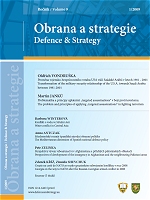Dědictví mnichovské smlouvy a jeho dopady na americkou zahraniční politiku
Legacy of Munich Treaty and its impact on American Foreign Policy
Author(s): Pavel HlaváčekSubject(s): Politics / Political Sciences
Published by: Univerzita obrany
Keywords: Mnichovská smlouva; paradigma Mnichova; politika appeasementu; americká zahraniční politika po roce 1945; vietnamská válka; vietnamské paradigma; Munich agreement; Munich paradigm; policy of appeasement; American foreign policy since 1945; Vietnam.
Summary/Abstract: In the following article we argue that the Munich Agreement (1938) – or generally the policy of appeasement itself – has been misunderstood and has been given negative content only due to the horrors of the Second World War. The lesson of Munich after 1945 led to false conclusion that the only way one might face dictatorship is never to negotiate. All US presidents – with the exception of Jimmy Carter – used Munich analogy in order to legitimize their foreign policy. This logic, we might call the Munich paradigm, played an important role in decision making process before the US interventions in Korea, Vietnam, Iraq (twice) and Kosovo. We believe that any analogy to Munich (or World War Two) is not adequate. It is time to think whether such analogy should not be avoided (not only) in the American foreign and security debate.
Journal: Obrana a strategie
- Issue Year: 9/2009
- Issue No: 1
- Page Range: 117-135
- Page Count: 19
- Language: Czech

